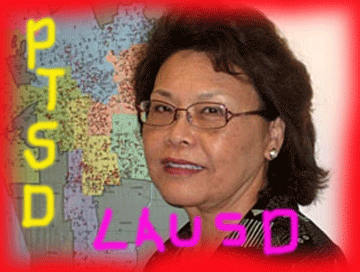
Marlene Wong, LAUSD director of crisis counseling
When we think of Post Traumatic Stress Disorder we generally imagine soldiers returning from a combat zone. But, as I’ve mentioned here before, alarming percentages of LA’s kids who are living and going to school in the city’s violence-ridden urban neighborhoods, when tested, are turning out to have PTSD symptoms that are equal to or greater than those of soldiers returning from Iraq and Afghanistan.
Yesterday, my pal KPCC’s Frank Stolz did a very smart, nuanced and extremely upsetting story on gang violence and post traumatic stress. It’s worth your while to listen to it online. But here are some excerpts:
Stoltze: Fifteen-year-old Alan lives near MacArthur Park just west of downtown Los Angeles.
Alan: I’ve had three friends die of gang violence, and they weren’t even from a gang. They just dressed like it. It made me pretty upset. I cried for two of them, and then the third one, I was just like, in shock. I was like, wow. I can’t believe that just happened again.[SNIP]
“….Street violence can be equally acute as combat, and just as persistent. It’s also because kids’ brains are still developing, so they’re more vulnerable to outside experiences. They are less capable than adults of putting experiences into context. One study found that 27% of students surveyed in south and east L.A. had classic PTSD symptoms: they were easily startled, had difficulty concentrating, and experienced recurring memories of violence….”
PTSD among inner city youth is the elephant in the middle of the room that, for decades, we have busily ignored when it comes to addressing a whole range of social problems, from school drop out rates to gang violence. It doesn’t cause those problems, but it is a piece of the puzzle with each.
Experts say that, in kids, PTSD can resemble Attention Deficit Disorder. Adolescents with PTSD will have trouble concentrating and will appear emotionally withdrawn. They can become depressed, angry, distrustful, fearful, and alienated, and they may feel betrayed. Many do not feel they have a future or believe they will reach adulthood. This is especially common among adolescents who are chronically exposed to community violence.
Stoltze: Dr. Kathy Sanders-Phillips teaches pediatrics at Howard University. She conducted one study that found African-American kids who’d experienced violence were up to three times more likely to use drugs or alcohol, or to engage in risky sex.
Kathy Sanders-Phillips: It’s like, you know, soldiers in combat. If you’re in a foxhole, why wouldn’t you smoke? (chuckles) Why wouldn’t you drink? Because your head can be blown off tomorrow.Stoltze: Sanders-Phillips says some kids shut down emotionally; she calls them “flatliners.” That’s not all living in a violent neighborhood can do.
Sanders-Phillips: There’s data that shows that kids growing up in communities like this show symptoms of more accelerated physiological functioning. In other words, if you bring these kids in, their heart rates are higher, their respiration is higher. They’re showing symptoms of what we call fight or flight. They show these symptoms all the time, not just on occasion.
As a culture, we have finally come to recognize the psychological harm suffered by military men and women who return from combat, and are working to offer them help. But there is next to nothing for the children and adolescents growing up in America’s urban war zones, many of whom are equally in need of help and/or treatment.
Stoltze: Marleen Wong of the L.A. school district concedes that most students with PTSD symptoms don’t get help, because teachers and counselors don’t recognize them. Wong says she needs more money to train staff, and to educate parents.
Wong: Once they realize it’s not the kid being bad or lazy, they completely understand. I mean, it changes the entire relationship. They become much more supportive. Because they were being punitive with their child.
Stoltze: Wong suggests it’s time to approach kids growing up in violent neighborhoods with compassion, and appropriate therapy.
Listen to the whole thing. It isn’t long. But it’s important.

I would like to do an article and offer a workshop on PTSD would you be interested in providing your expertise.